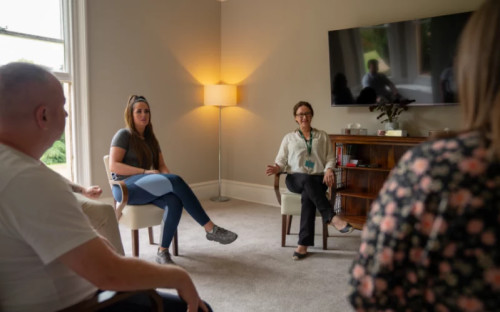








Steps Together - Rainford Hall
Verified Center
This provider's information has been quality-checked by Recovery.com's Research Team for accuracy and completeness, including center verification through appropriate third-party organizations.
Treatment Focus
This center treats substance use disorders and mental health conditions. You'll receive individualized care catered to your unique situation and diagnosis, learn practical skills for recovery, and make new connections in a restorative environment.
Primary Level of Care
Offering intensive care with 24/7 monitoring, residential treatment is typically 30 days and can cover multiple levels of care. Length can range from 14 to 90 days typically.
Treatment Focus
This center treats substance use disorders and mental health conditions. You'll receive individualized care catered to your unique situation and diagnosis, learn practical skills for recovery, and make new connections in a restorative environment.
Primary Level of Care
Offering intensive care with 24/7 monitoring, residential treatment is typically 30 days and can cover multiple levels of care. Length can range from 14 to 90 days typically.
Private Pay
You pay directly for treatment out of pocket. This approach can offer enhanced privacy and flexibility, without involving insurance. Exact costs vary based on program and length of stay. Contact the center for specific details.
Steps Together - Rainford Hall
Steps Together - Rainford Hall
About Steps Together - Rainford Hall
Established in 2017 and led by a team with over 20 years of experience in the addiction treatment, Steps Together is committed to helping individuals and their families struggling with addiction, anxiety, depression, and stress. Steps Together offers a combination of residential and outpatient therapy in luxury residential settings. Their Rainford Hall estate is just 1 out of the 5 locations Steps Together offers.
A Therapeutic And Personal Approach
Steps Together’s approach rests on 3 pivotal pillars: reset, reframe, and recover. Clinical detoxification allows clients to reset, and therapeutic care helps reframe thinking and sets clients up for long-term recovery. During treatment, Steps Together takes a personalized approach to recovery, offering client-centered therapy like individual talk therapy, art and music therapy, 12-Step groups, and mindfulness. They also have friendly dogs on-site that guests can interact with or take for contemplative walks.
Expert Staff And a Variety of Treatment Options
Compassion and expertise drive the staff at Steps Together. Their combined experience makes them highly qualified in addiction and mental health treatment, clinically and therapeutically. Clients at Rainford Hall receive detox if it’s needed, led by clinicians for comfort and safety. Outpatient programs and aftercare keep clients well-supported and connected to recovery as they return to their homes and lives.
Private, Luxurious Living
Rainford Hall is located on 600 acres in the peaceful countryside between Lancashire and Merseyside. Their elegant home boasts colonial decor and large social spaces, including a grand dining room, a fully equipped gymnasium, private therapy rooms, beautiful treatment lounges, and an on-site spa. Steps Together provides 19 private bedroom suites, along with gourmet meals prepared by in-house chefs that can accommodate specific dietary needs.
Accredited by the CQC
Steps Together is a private pay residential facility. Notably, they are regulated by the Care Quality Commission (CQC) to offer the most effective and safe treatment programs in comfortable, luxury environments.
Highlights from the Center
Highlights
These highlights are provided by and paid for by the center.
Customized Treatment Plans
On-site Spa
Holistic Approach
Wellness Emphasis
Center Overview
Treatment Focus
This center treats substance use disorders and mental health conditions. You'll receive individualized care catered to your unique situation and diagnosis, learn practical skills for recovery, and make new connections in a restorative environment.

Steps Together - Rainford Hall
Pricing and Program Length
Estimated Center Costs
The cost listed here (£3,300 - £22,500), is an estimate of program cost. Center price can vary based on program and length of stay. Contact the center for more information. Recovery.com strives for price transparency so you can make an informed decision.




Recovery.com Verified Listing
Recovery.com verified that the name, location, contact information and license to operate for this treatment provider are valid and up-to-date.

Registered with Companies House
Recovery.com is an independent, third-party mental health resource. Verification does not imply endorsement and does not guarantee the quality of treatment services.
Meet Your Care Team

Darren Rolfe
Chief Executive & Founder

Steve Jones
Deputy CEO

Paul Mudie
Group Operations Director

Cathy Hall
Group Clinical Services Director

Kelly Watson
Therapy Services Manager
BAPCH

John Wilson
Group Therapy Services Director

Kerry Drew
Senior Treatment Adviser

Lisa Brown
Therapy Services Manager
Your Care Options
Specializations
Alcohol
Using alcohol as a coping mechanism, or drinking excessively throughout the week, signals an alcohol use disorder.
Anxiety
Anxiety is a common mental health condition that can include excessive worry, panic attacks, physical tension, and increased blood pressure.
Burnout
Burnout entails mental and physical exhaustion, and leads to a severe lack of fulfillment. This condition is often caused by overwork.
Depression
Symptoms of depression may include fatigue, a sense of numbness, and loss of interest in activities. This condition can range from mild to severe.
Drug Addiction
Drug addiction is the excessive and repetitive use of substances, despite harmful consequences to a person's life, health, and relationships.
Opioids
Opioids produce pain-relief and euphoria, which can lead to addiction. This class of drugs includes prescribed medication and the illegal drug heroin.
Trauma
Some traumatic events are so disturbing that they cause long-term mental health problems. Those ongoing issues can also be referred to as "trauma."
Who We Treat
Young Adults
Emerging adults ages 18-25 receive treatment catered to the unique challenges of early adulthood, like college, risky behaviors, and vocational struggles.
LGBTQ+
Addiction and mental illnesses in the LGBTQ+ community must be treated with an affirming, safe, and relevant approach, which many centers provide.
Midlife Adults
For adults ages 40+, treatment shifts to focus on the unique challenges, blocks, and risk factors of their age group, and unites peers in a similar community.
Mild Disabilities
Adults with mild physical or intellectual disabilities receive treatment catered to their specific needs in a safe and clinically supportive environment.
Pregnant Women
Addiction and mental health treatment meets the clinical and psychological needs of pregnant women, ensuring they receive optimal care in all areas.
Professionals
Busy, high-ranking professionals get the personalized treatment they need with greater accommodations for work, privacy, and outside communication.
Treatment Services
Detox
Detox fully and safely removes toxic substances from the body, allowing the next steps in treatment to begin with a clean slate.
Outpatient
During outpatient rehab, patients attend a structured treatment program while continuing to live at home.
Residential
In a residential rehab program, patients live onsite, with access to daily treatment and 24-hour care. An average stay is 30-90 days.
Approaches
Evidence-Based
A combination of scientifically rooted therapies and treatments make up evidence-based care, defined by their measured and proven results.
Holistic
A non-medicinal, wellness-focused approach that aims to align the mind, body, and spirit for deep and lasting healing.
Individual Treatment
Individual care meets the needs of each patient, using personalized treatment to provide them the most relevant care and greatest chance of success.
Twelve Step
Incorporating spirituality, community, and responsibility, 12-Step philosophies prioritize the guidance of a Higher Power and a continuation of 12-Step practices.
Therapies
1-on-1 Counseling
Patient and therapist meet 1-on-1 to work through difficult emotions and behavioral challenges in a personal, private setting.
Meditation & Mindfulness
A practiced state of mind that brings patients to the present. It allows them to become fully aware of themselves, their feelings, and the present moment.
Online Therapy
Patients can connect with a therapist via videochat, messaging, email, or phone. Remote therapy makes treatment more accessible.
Mindfulness Therapy
This ancient practice can be mental, emotional, and even spiritual. In meditation, you focus your attention on the present moment without judgement.
Art Therapy
Visual art invites patients to examine the emotions within their work, focusing on the process of creativity and its gentle therapeutic power.
Family Therapy
Family therapy addresses group dynamics within a family system, with a focus on improving communication and interrupting unhealthy relationship patterns.
Gestalt Therapy
This treatment teaches self-awareness, interrupts negative thought patterns, and gives patients insight into how their environment impacts mental health.
Motivational Interviewing
Based on the idea that motivation to change comes from within, providers use a conversational framework to discover personalized methods for change.
Conditions We Treat
Anxiety
Anxiety is a common mental health condition that can include excessive worry, panic attacks, physical tension, and increased blood pressure.
Burnout
Burnout entails mental and physical exhaustion, and leads to a severe lack of fulfillment. This condition is often caused by overwork.
Codependency
Codependency is a pattern of emotional dependence and controlling behavior. It's most common among people with addicted loved ones.
Depression
Symptoms of depression may include fatigue, a sense of numbness, and loss of interest in activities. This condition can range from mild to severe.
Gambling
Excessive, repetitive gambling causes financial and interpersonal problems. This addiction can interfere with work, friendships, and familial relationships.
Post Traumatic Stress Disorder
PTSD is a long-term mental health issue caused by a disturbing event or events. Symptoms include anxiety, dissociation, flashbacks, and intrusive thoughts.
Sex Addiction
Compulsively seeking out sex can easily become a problem. This addiction is detrimental to relationships, physical health, and self-esteem.
Stress
Stress is a natural reaction to challenges, and it can even help you adapt. However, chronic stress can cause physical and mental health issues.
Trauma
Some traumatic events are so disturbing that they cause long-term mental health problems. Those ongoing issues can also be referred to as "trauma."
Substances We Treat
Alcohol
Using alcohol as a coping mechanism, or drinking excessively throughout the week, signals an alcohol use disorder.
Benzodiazepines
Benzodiazepines are prescribed to treat anxiety and sleep issues. They are highly habit forming, and their abuse can cause mood changes and poor judgement.
Co-Occurring Disorders
A person with multiple mental health diagnoses, such as addiction and depression, has co-occurring disorders also called dual diagnosis.
Cocaine
Cocaine is a stimulant with euphoric effects. Agitation, muscle ticks, psychosis, and heart issues are common symptoms of cocaine abuse.
Drug Addiction
Drug addiction is the excessive and repetitive use of substances, despite harmful consequences to a person's life, health, and relationships.
Ecstasy
Ecstasy is a stimulant that causes intense euphoria and heightened awareness. Abuse of this drug can trigger depression, insomnia, and memory problems.
Heroin
Heroin is a highly addictive and illegal opioid. It can cause insomnia, collapsed veins, heart issues, and additional mental health issues.
Psychedelics
Hallucinogenic drugs—like LSD—cause euphoria and increased sensory experiences. When abused, they can lead to depression and psychosis.
Languages
Aftercare
Care Designed for Your Needs
Personal Amenities
Amenities
Special Considerations
Center Pets
Addiction and mental health facilities with pets allow patients to interact with friendly dogs, cats, horses, and in some cases, even dolphins.
Executive Program
Addiction and mental health treatment for executives typically involves high discretion, greater technology access, and more private, 1-on-1 care.
Flexible technology policies
Centers with flexible technology policies allow professionals to stay in touch with work and give patients a greater sense of connection and normalcy.
Activities
Yoga
Yoga is both a physical and spiritual practice. It includes a flow of movement, breathing techniques, and meditation.
Off-Site Activities
Off-Site Amenities

Learn More About the Center
The History of Rainford Hall
Learn more about Steps Together’s newest location in the rolling countryside.
Pete’s Story of Sobriety
Read Pete’s story of recovery and how he continues to overcome challenges, specifically around the holidays.
Common Questions for Steps Together
See answers to common questions about treatment, like tech use, visitations, and more.
Primary Care Programme at Steps Together
Discover how this structured detoxification programme supports recovery journeys.
What people are saying
Treatment
4.5
Accommodations
4.0
Food & Nutrition
4.7
Value
4.2
Pros
- Friendly & Competent Staff (11)
- Confidential (10)
- Treated With Respect (10)
- Excellent & Effective Treatment Programming (9)
Cons
- Not Enough Time With Therapist (4)
- Shallow Post-Treatment Planning (2)
- Poor Internet Connection (2)
Geoff
Treatment in 2022 • (10 days) • Reviewed 01/04/23
Former Client
•Retired
Edward George
Treatment in 2019 • (180+ days) • Reviewed 01/15/23
Former Client
•Sandbanks
DG
Treatment in 2020 • (30 days) • Reviewed 01/03/23
Former Client
•Accountant
•Nottinghamshire
Paula
Treatment in 2022 • (30 days) • Reviewed 01/09/23
Former Client
•Admin Assistant
•Luton
Olly D.
Treatment in 2020 • (14 detox, 28days secondary care) • Reviewed 01/03/23
Former Client
•Delivery driver
•West Yorkshire





